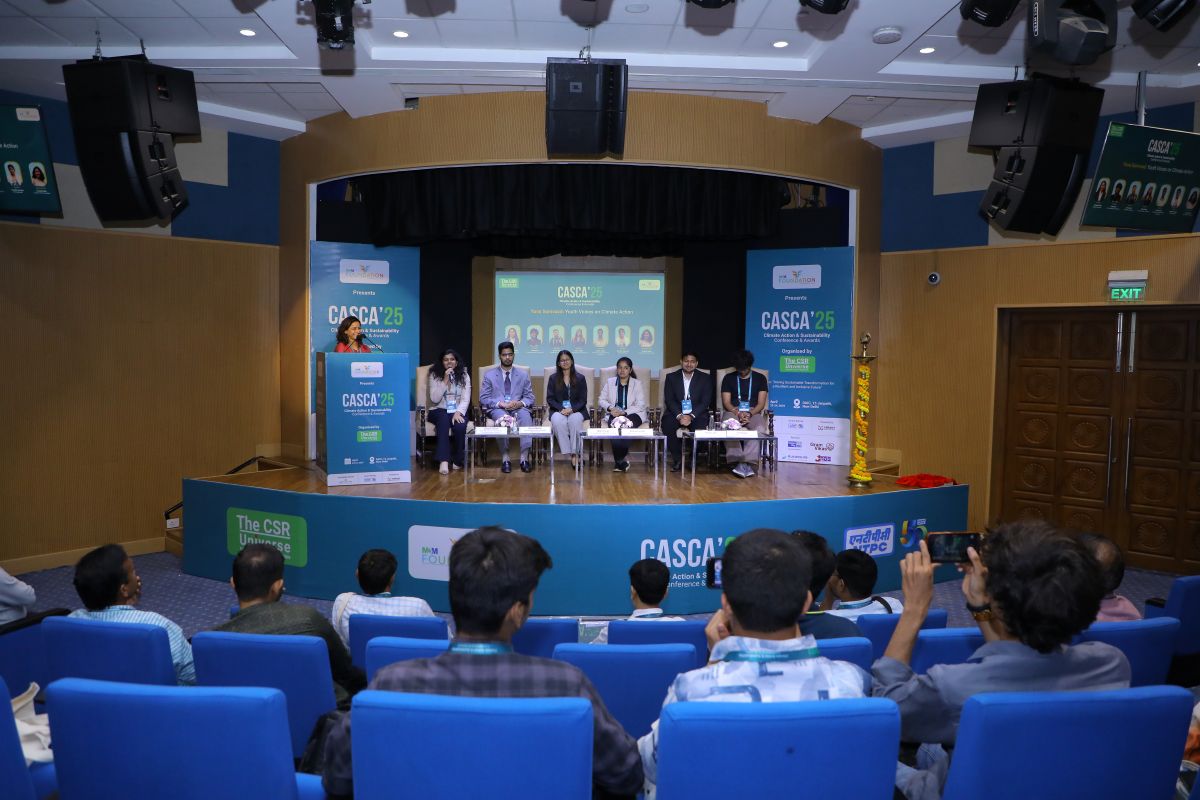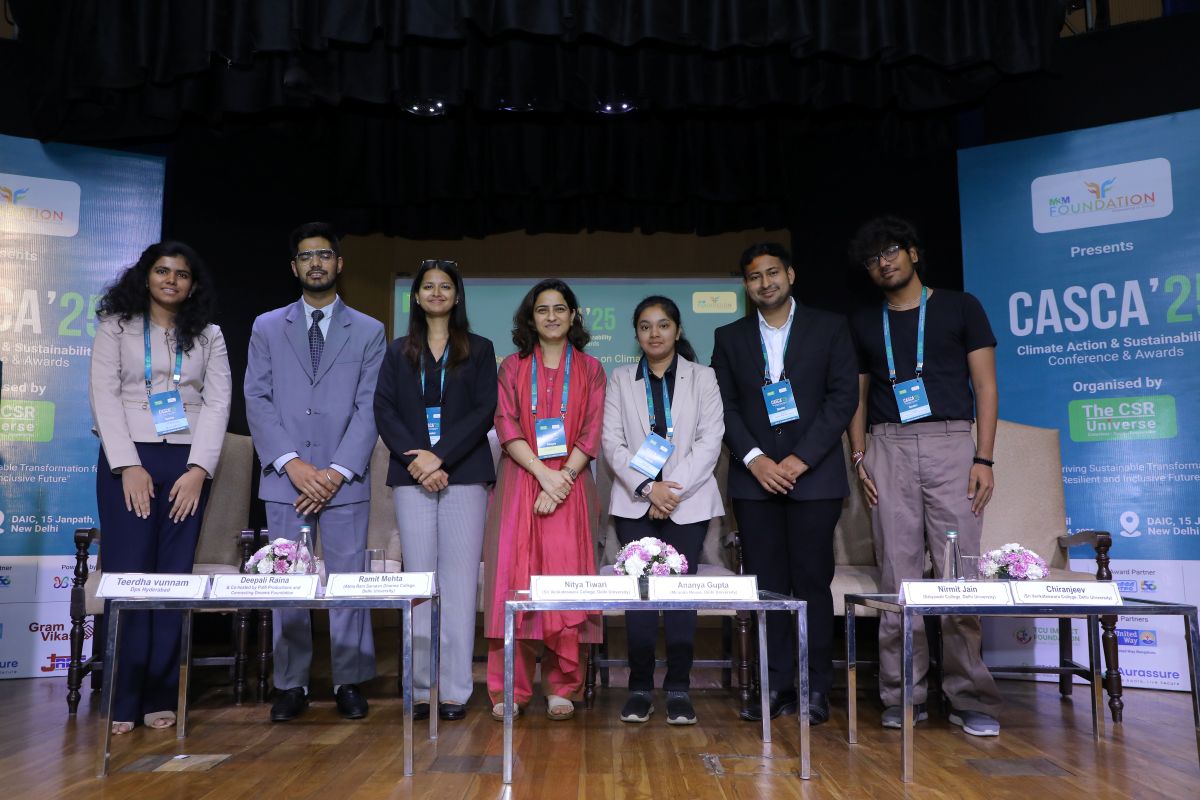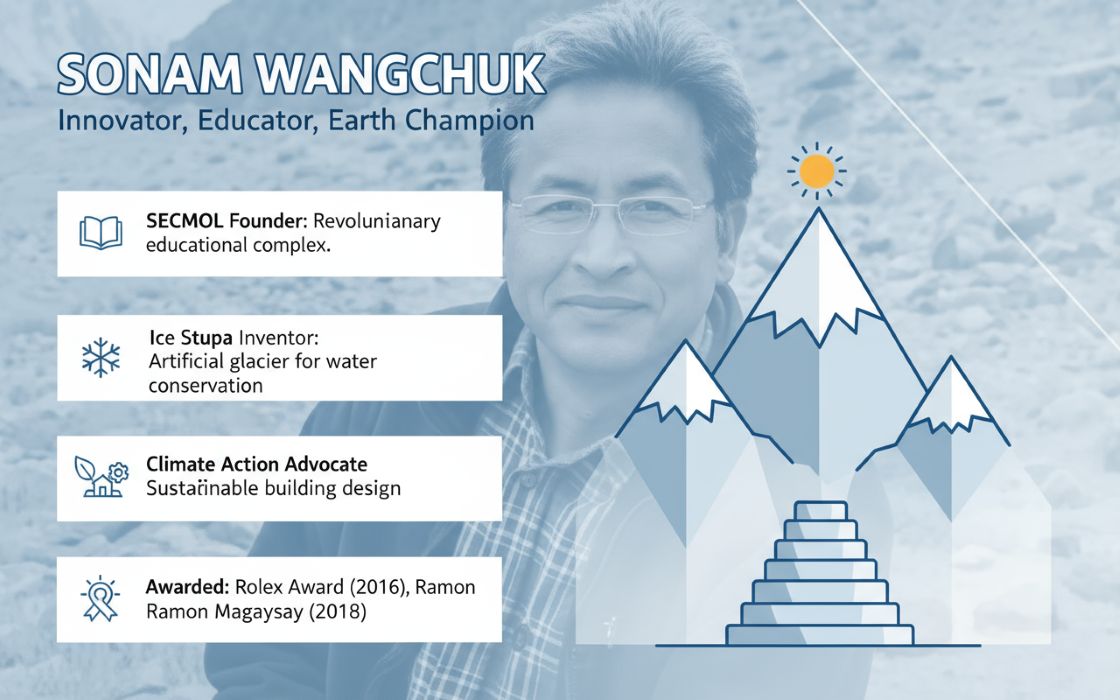In a world where the climate crisis is not a distant threat but an everyday reality, the voices of young people are not just being heard—they are leading the charge, especially Gen Z—who are transforming concern into commitment. This was the resounding message of “Yuva Samvaad: Youth Voices on Climate Action ,” a panel discussion at the Climate Action and Sustainability Conference & Awards (CASCA’25), organised by TheCSRUniverse, presented by M3M Foundation and powered by YBRANT. Co-hosted by Potli Productions and Connecting Dreams Foundation, the session brought together six student leaders from Delhi University and a special young guest, Teerdha Vunnam, a 17-year-old climate advocate from Hyderabad, to share their vision for a sustainable future.
From Crisis to Consciousness: Youth Reframing the Climate Narrative
Moderated by Deepali Raina, Founder of Potli Productions, the panel opened with a simple yet profound question: How do you define climate change in one word? The answers—“crisis,” “urgency,” “disaster,” and “interconnectedness”—revealed the depth of understanding and concern among young leaders. As Ananya Gupta from Miranda House noted, “We are the most climate-conscious generation. There are many scattered initiatives led by youth, but platforms like CASCA’25 bring them together—and that’s incredibly powerful.”
The panelists emphasized that climate change is not just an environmental issue but a lived reality that affects every aspect of their lives. Their responses reflected a sense of urgency and a holistic view of the crisis, recognizing that solutions require both systemic change and individual responsibility.
On-Ground Actions: Seeds of Change
Personal stories of climate leadership took center stage. Chiranjeev from Sri Venkateswara College shared how a school-led seedball festival in his drought-prone hometown of Ramanathapuram, Tamil Nadu, blossomed into a community-wide movement. “From 50,000 seedballs in the first year to over 5 million today, this initiative has directly contributed to water retention and afforestation,” he said proudly. His story illustrated how grassroots efforts can scale up to make a tangible impact on local ecosystems. 
Teerdha, the youngest panelist, recounted her journey as an environmental activist, which began at the age of two. She spoke about founding the “Ozone Run” in Hyderabad, a campaign focused on civic and environmental issues. In 2024, her initiative collected over 60,000 petitions to improve city sanitation, prompting immediate action from local authorities. “Start wherever you are. What matters most is consistency. If your action impacts even one person, that ripple can spark change,” she said. Her words underscored the importance of persistence and community engagement.
Sustainability Through Livelihood and Lifestyle
Nirmit Jain from Satyawati College introduced Project Daily Drip, a social enterprise that recycles boutique fabric waste into tote bags, designed and produced by underprivileged women. “It’s not just about recycling. It’s about dignified livelihoods, community empowerment, and giving sustainability a fashionable face,” he explained. This initiative highlighted how environmental action can be intertwined with social justice and economic empowerment.
Ananya Gupta shared a more personal approach, describing how her family separates kitchen waste to create bio-fertilizers for their home garden. “It’s easy to blame the system, but individual responsibility starts at home,” she emphasized. Her story served as a reminder that sustainable living begins with small, everyday actions.
The Power and Perils of Social Media
Ramit Mehta from Atma Ram Sanatan Dharma College discussed the dual role of digital platforms in climate activism. “Social media is a tool of education and mobilization. Youth can organize protests, build global networks, and advocate for change, even across borders,” he said. He referenced recent movements opposing deforestation in Telangana, showing how online awareness can translate into real-world action.
However, the panelists also cautioned against over-reliance on digital engagement. “While we connect online, let’s not forget to talk to people around us—our families, our communities. Climate wisdom also lives at home,” Deepali Raina reminded the audience. This balanced perspective highlighted the need for both digital and face-to-face conversations in driving change.
Policies, Careers, and the Missing Seat at the Table
The discussion turned to the challenges young people face in influencing policy and building careers in sustainability. Nitya Tiwari from Sri Venkateswara College pointed out the stark gap between youth population and policy influence: “Youth under 30 form nearly 50% of India’s population but represent less than 3% in policymaking. We don’t just want a seat at the table—we want to shape the table.”
She advocated for stronger redistribution frameworks and carbon pricing policies, alongside reparative justice for communities affected by environmental degradation. Nirmit Jain raised concerns about the limited career opportunities in CSR and ESG fields, despite growing interest. “There’s curiosity, but no clear career path. Companies and institutions must create more opportunities so youth can translate passion into professions,” he said.
Education: The Foundation of Climate Leadership
Education emerged as a recurring theme throughout the panel. Ananya proposed integrating one hour of hands-on climate action into school curricula each week. Ramit expanded on this, suggesting that practical projects—rather than rote theory—be rewarded with academic credits to encourage innovation and engagement.
Chiranjeev summarized the sentiment: “We’ve learned the theory of greenhouse gases and monsoons. Now it’s time to act on that knowledge.”
Conscious Technology and Responsible Consumption
Chiranjeev also raised awareness about the environmental costs of technology. “One AI search can use half a litre of water to cool the servers. Multiply that by billions of searches—it’s a hidden environmental cost,” he cautioned. He urged young people to be mindful users of digital tools, balancing necessity with sustainability. 
From Crisis to Commitment: Words of Hope
In the final moments, each panelist was asked to share one word that gave them hope. The answers—“passion,” “purpose,” “influence,” “future”—stood in stark contrast to the fearful terms that opened the session. It was a symbolic transition: from despair to determination.
As the session closed, the message was clear—youth are not just the future of climate action; they are its present. With platforms like Yuva Samvaad, their voices are finally beginning to shape the narrative.
Conclusion
The Yuva Samvaad panel at CASCA’25 showcased the passion, creativity, and resilience of young changemakers. Their stories and insights demonstrated that climate action is not just about policies and protests, but about everyday choices, community engagement, and the courage to demand change. As Teerdha reminded us, “Start wherever you are. What matters most is consistency. If your action impacts even one person, that ripple can spark change.”
With youth at the forefront, the journey from crisis to commitment is already underway.








.jpg)






